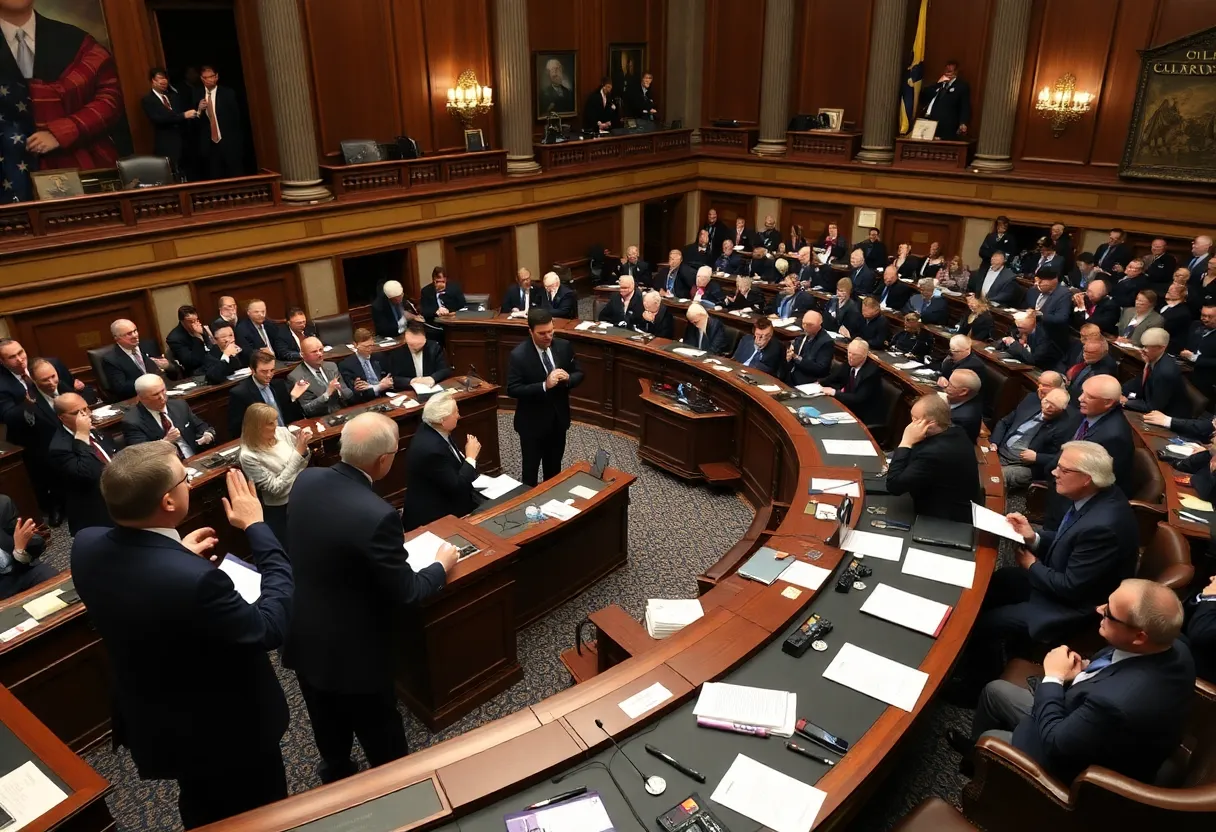News Summary
Senate Republicans narrowly approved a crucial procedural step for President Trump’s tax cuts and spending bill, aiming to reshape federal taxation and funding. Significant debates revolve around lowering federal taxes, increasing military spending, and cutting safety-net programs like Medicaid. As negotiations continue, amendments and votes could determine the bill’s future, amid mixed support within the party and pushback from Democrats using delay tactics.
Senate Republicans Make Progress on Trump’s Tax and Spending Bill
In a significant move on Saturday, Senate Republicans cast their votes by a narrow margin of 51-49 to clear a key procedural hurdle for President Donald Trump’s proposed tax cuts and spending bill. The plan has sparked considerable debate and some controversy as it aims to reshape federal taxation and government funding.
What’s in the Bill?
The bill highlights several ambitious goals, including lowering federal taxes, boosting military and border security funding, and, notably, reducing government safety-net programs like Medicaid. These changes are intended to revamp existing systems and provide heightened allocations for national defense and border control.
Tough Negotiations Ahead
However, the path to final passage won’t be easy. Republican leaders are now in a tight spot as they have to negotiate various updates to appease holdouts within their party who are reluctant to back the bill. President Trump has set a tight timeline, eyeing the opportunity to sign the legislation by July 4. Yet, the bill still has to make its way through the House after securing approval from the Senate.
Aiming for Quick Action
The recent Senate vote sets the stage for a potential final passage vote as early as Monday. The president celebrated the positive outcome of the vote, publicly thanking a few key Senators for their support, indicating a sense of urgency and expectation surrounding the bill’s progression.
Back and Forth Among Senators
Interestingly, not everyone is on board. Two Republican Senators, Thom Tillis and Rand Paul, expressed their disapproval, voting against advancing the bill. In contrast, Vice President JD Vance played an active role in the Capitol, working to persuade fellow senators and break any potential tie votes.
Senator Lisa Murkowski, who initially appeared hesitant, shifted her stance in favor of the bill after some provisions were injected that would benefit Alaska. This change highlights the dynamic nature of support within the party as different interests come into play.
Democrats Delay With Tactics
Meanwhile, Democrats have been leveraging a delay tactic, taking advantage of the bill’s lengthy text, which they plan to read out loud. This process is projected to take anywhere from 10 to 15 hours. Following this reading, a so-called “vote-a-rama” is set to unfold, featuring a string of amendment votes that could apply pressure on the Republicans.
Potential Amendments on the Horizon
A noteworthy development comes from Senator Susan Collins, who hinted that she might propose her amendments. This could lead to significant implications, as she has threatened to vote against the final bill if her suggestions are not incorporated. As discussions about potential amendments begin, eyes are on capping enrollment in Medicaid expansion and the responses this will elicit from weary Republicans, some of whom have voiced concerns over the suggested Medicaid cuts.
Concerns From All Sides
The bill has not only sparked division among Republicans but is also met with skepticism from House members. Speaker Mike Johnson recently held discussions with House Republicans to rally support, but dissent about potential changes to Medicaid remains a sticking point. Concerns were also expressed by some House Republicans, like Rep. David Valadao, who worry about the bill’s impact on Medicaid.
Looking Ahead
Observers are wary of the bill’s popularity, noting that it might face backlash among various demographic and income groups. Analysts, without bias, warn that this proposed bill could lead to a troubling increase in national debt, and there are fears regarding its potential to shift wealth from the poorest to the richest Americans.
As the weeks unfold, the outcome of this pivotal legislation is sure to be a hot topic in political circles. Stay tuned for more developments as this story evolves!
Deeper Dive: News & Info About This Topic
- CNN: Senate GOP Trump Agenda Bill
- Wikipedia: Tax Reform in the United States
- The New York Times: Senate Republicans Reconciliation
- Google Search: Senate Republicans Trump Bill
- Al Jazeera: Senate Republicans Vote to Advance Trump’s Bill
- Encyclopedia Britannica: United States Government
- AP News: Trump Tax Breaks Spending Cuts Senate Deadline
- Google News: Trump Tax Bill 2025
- Politico: Congress Mega Bill Reading Out Loud
- Google Scholar: Trump Spending Bill

Author: STAFF HERE ORLANDO WRITER
ORLANDO STAFF WRITER The ORLANDO STAFF WRITER represents the experienced team at HEREOrlando.com, your go-to source for actionable local news and information in Orlando, Orange County, and beyond. Specializing in "news you can use," we cover essential topics like product reviews for personal and business needs, local business directories, politics, real estate trends, neighborhood insights, and state news affecting the area—with deep expertise drawn from years of dedicated reporting and strong community input, including local press releases and business updates. We deliver top reporting on high-value events such as Orlando International Fringe Theatre Festival, Megacon Orlando, and Central Florida Fair. Our coverage extends to key organizations like the Orlando Economic Partnership and Hispanic Chamber of Commerce Metro Orlando, plus leading businesses in leisure and hospitality that power the local economy such as Walt Disney World Resort, AdventHealth, and Universal Orlando. As part of the broader HERE network, including HEREJacksonville.com, HEREPetersburg.com, HERETallahassee.com, and HERETampa.com, we provide comprehensive, credible insights into Florida's dynamic landscape.




